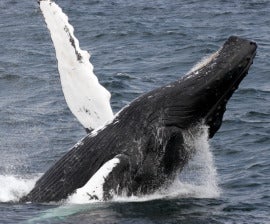-

Vicki Beaver/iStockphotography
FLORIANOPOLIS, Brazil—On the third day of the 67th annual meeting of the International Whaling Commission in Florianopolis, Brazil, the Commission adopted two resolutions, focused on recognizing the crucial role of whales in ecosystems, and mitigating the threat of anthropogenic (human-caused) noise pollution on cetaceans. The delegates also endorsed the IWC’s new bycatch initiative which addresses a massive threat to cetaceans worldwide.
Rebecca Regnery, Senior Director of Wildlife, Humane Society International, says: “The IWC’s Bycatch Mitigation Initiative is of special importance to whale conservation and health. Each year around the world, hundreds of thousands of whales, dolphins and porpoises are accidentally caught and drowned in fishing nets, causing immense suffering and threatening several species with extinction. The IWC is forging a pathway for countries and international partners to find solutions to this global problem.”
The resolution on noise pollution was another triumph, with the IWC agreeing to work with other international bodies to try and address this threat. Regnery says: “Whales use sound to help them navigate the vast oceans, but human-caused noise pollution can interfere with their ability to sense their environment and communicate with each other over vast distances. This acoustic fog can have serious detrimental impacts on cetaceans, and other forms of noise pollution resulting from industrial or military activity, can even cause physical harm.”
Take action now to help whales.
The third measure also shows how far the IWC has evolved in recent years. While the Commission has traditionally looked at whales as resources to be utilized, science now reveals a different and important role for whales as ‘ecosystem engineers’ – moving deep sea nutrients into the sunlight where their fecal plumes fertilize the waters there and help ecosystem productivity. Today, in a significant change of emphasis, the IWC agreed to focus more on this topic.
Later this week the IWC will vote on a raft of proposals by Japan aimed at smoothing a path for the resumption of commercial whaling. Regnery reflects: “Seeing these cetacean conservation measures pass here at the IWC is a bittersweet experience. It is thrilling to see the IWC play such a globally important role in protecting cetaceans in their marine environment and recognizing the vital and unique role these ocean giants play in keeping our seas healthy. Yet all the while there are moves here at the IWC by Japan and others to kill these very same whales for profit.”
HSI’s whale experts at the IWC are available for interview, contact whiggins@hsi.org
ENDS
Media contact: Wendy Higgins, Director of International Media, whiggins@hsi.org
